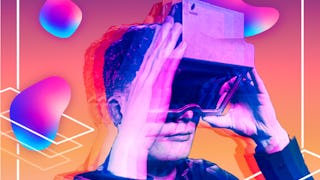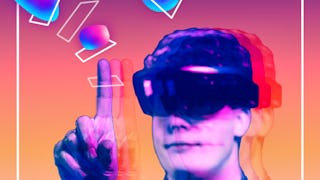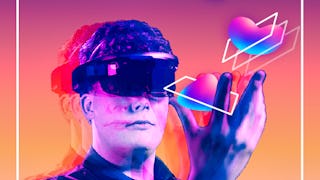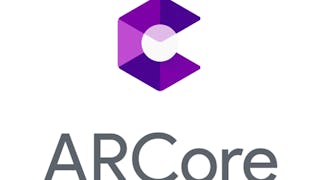This first course in the XR for Everybody specialization creates a foundational understanding of the differences between AR, VR, MR, and XR. The course provides learners with a broad overview of the rapidly evolving XR space and the tools to characterize future XR developments and assess their potential and limitations. It establishes key concepts and dives into the XR device landscape, helping learners to differentiate current and future platforms and devices as well as critique the use of VR or AR in applications. The course pivots in the second half to look more at how to shape the future of XR, by analyzing trends and raising issues such as COVID-19, social and ethical concerns, accessibility and equity, as well as privacy and security.

Enjoy unlimited growth with a year of Coursera Plus for $199 (regularly $399). Save now.

Intro to AR/VR/MR/XR: Technologies, Applications & Issues
This course is part of Extended Reality for Everybody Specialization

Instructor: Michael Nebeling
26,234 already enrolled
Included with
(408 reviews)
What you'll learn
Explain the conceptual and technological differences between VR, AR, MR, and XR.
Understand strengths and weaknesses of VR and AR for new XR applications.
Summarize the XR technology landscape in terms of platforms, devices, applications, and tools.
Devise a strategic plan to incorporate XR into new projects and initiatives.
Skills you'll gain
- Information Privacy
- Innovation
- Augmented Reality
- Virtual Environment
- Diversity Equity and Inclusion Initiatives
- Ethical Standards And Conduct
- Conceptual Design
- Virtual Reality
- Augmented and Virtual Reality (AR/VR)
- Safety and Security
- User Experience Design
- Emerging Technologies
- Human Computer Interaction
- Display Devices
- Personally Identifiable Information
- Web Content Accessibility Guidelines
- Design Strategies
Details to know

Add to your LinkedIn profile
5 assignments
See how employees at top companies are mastering in-demand skills

Build your subject-matter expertise
- Learn new concepts from industry experts
- Gain a foundational understanding of a subject or tool
- Develop job-relevant skills with hands-on projects
- Earn a shareable career certificate

There are 4 modules in this course
This module will establish the different notions around XR and provide a brief overview of the associated technologies. Key to understanding the potential and limitations of AR, VR, and MR is to know the differences in how they each work and what they each can be used for. In the honors track, you will learn how to find and try out an AR experience and classify it along the reality–virtuality continuum. This continuum is an important notion to localize applications in the wide spectrum covered by mixed reality technologies and aids our overall understanding of the XR space.
What's included
7 videos19 readings1 assignment2 app items3 discussion prompts1 plugin
This module will provide an overview of virtual and augmented reality both at the conceptual level as well as in terms of current technologies. It is important to distinguish concepts from technologies because the concepts are foundational and less likely to change significantly while the technologies that implement the concepts are rapidly evolving. In the honors track, we will use the conceptual and technological insights we developed through the standard track to recommend AR or VR technologies for a set of given scenarios. A key goal for us is to obtain a thorough overview of the technology landscape and this activity will allow you to practice your decision making and how to analyze and assess different technology options.
What's included
13 videos10 readings1 assignment2 app items
This module will start our discussion of the opportunities and challenges that come with XR technologies. I will identify technological trends and what I think are some of the key issues. The issues will be grouped into three broader classes: ethical & social concerns, accessibility & equity, privacy & security. All three classes are important and we currently only have a limited understanding and clear ways forward regarding each of them. In the honors track, we will work through some of these issues and, depending on your interests and access to XR technologies, you can set your focus on one of the classes of issues. There will be activities to learn more about social experiences in AR/VR, accessibility, and privacy. I look forward to an open and constructive discussion with you about these issues and the future of XR technologies.
What's included
9 videos20 readings2 assignments2 app items2 discussion prompts
This is our last module in this course. It will bring more of a strategic outlook into the XR space. This is a space where you have to continuously learn and push yourself. I believe you have to develop a growth mindset when you think about new projects and initiatives, your team, the equipment, working with stakeholders, and defining measures of success. The key is to start somewhere, with something small, then grow your experience and expectations around it. Most people try it the other way around, not realizing that XR is a huge space and there will always be people who know more than you about something. In my opinion, the best way to go about this is to find a niche, realize the potential to innovate, and start shaping your solution. This module is heavily discussion-based and there is no honors track associated with it. Thank you for taking this first course, and please check out the other two courses in this series!
What's included
7 videos8 readings1 assignment4 discussion prompts
Earn a career certificate
Add this credential to your LinkedIn profile, resume, or CV. Share it on social media and in your performance review.
Instructor

Offered by
Explore more from Design and Product
 Status: Free Trial
Status: Free TrialUniversity of Michigan
 Status: Free Trial
Status: Free TrialUniversity of Michigan
 Status: Free Trial
Status: Free TrialUniversity of Michigan
 Status: Preview
Status: PreviewGoogle AR & VR
Why people choose Coursera for their career




Learner reviews
408 reviews
- 5 stars
81.86%
- 4 stars
13.48%
- 3 stars
1.71%
- 2 stars
1.71%
- 1 star
1.22%
Showing 3 of 408
Reviewed on Mar 7, 2023
The course really introduced me to the concepts of Mixed reality and the technologies involved in the XR space
Reviewed on Mar 11, 2022
This course is an exceptionally thorough overview course for beginners with no XR experience at all. Highly recommend if you are interested in learning more about the technologies and issues in XR.
Reviewed on Jun 24, 2022
It was trully a great experience to gain knowlegde about these techs and innovations.

Open new doors with Coursera Plus
Unlimited access to 10,000+ world-class courses, hands-on projects, and job-ready certificate programs - all included in your subscription
Advance your career with an online degree
Earn a degree from world-class universities - 100% online
Join over 3,400 global companies that choose Coursera for Business
Upskill your employees to excel in the digital economy
Frequently asked questions
No. This course goes over all the concepts and technologies. Even if you already have experience with AR/VR, the course provides a foundation for other courses in this specialization. In particular, the second half of the course is focused on the future of XR, analyzing trends, discussing issues, and suggesting strategies in the XR space.
No. This course is targeted at a broad audience. There are no programming exercises associated with it. Depending on your background and interest, you may choose to approach exercises from a more technical perspective. But even if you’ve never experienced AR/VR before, this course will help you build the technical knowledge to make decisions about XR projects and initiatives.
No. To complete the main track of the course, it is recommended but not required. However, to complete the honors track, you will need access to AR/VR devices. To give AR a try, you need to have access to a smartphone. For VR, we do not recommend a particular device and suggest that at a minimum you use a Google Cardboard compatible display wrapper that turns your phone into VR goggles.
More questions
Financial aid available,

